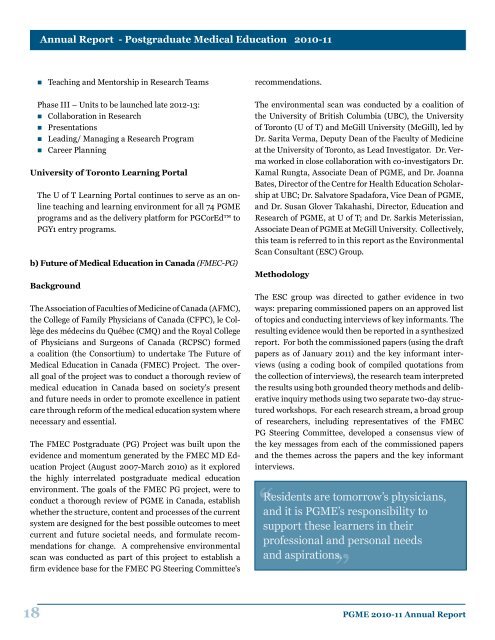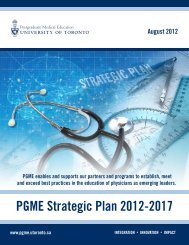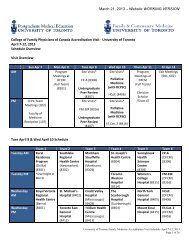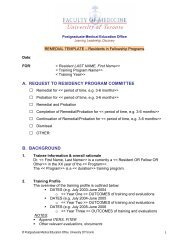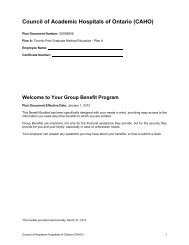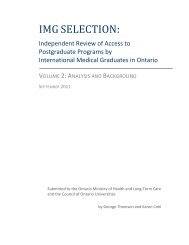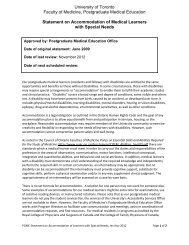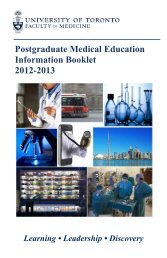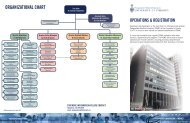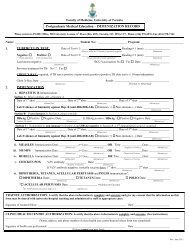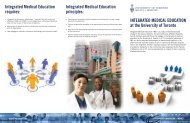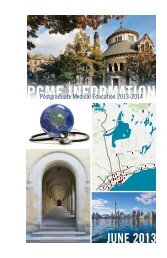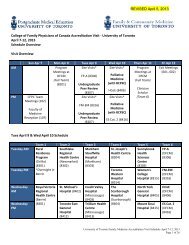PGME Annual Report 2011 - Post Graduate Medical Education ...
PGME Annual Report 2011 - Post Graduate Medical Education ...
PGME Annual Report 2011 - Post Graduate Medical Education ...
You also want an ePaper? Increase the reach of your titles
YUMPU automatically turns print PDFs into web optimized ePapers that Google loves.
<strong>Annual</strong> <strong>Report</strong> - <strong>Post</strong>graduate <strong>Medical</strong> <strong>Education</strong> 2010-11<br />
• Teaching and Mentorship in Research Teams<br />
Phase III – Units to be launched late 2012-13:<br />
• Collaboration in Research<br />
• Presentations<br />
• Leading/ Managing a Research Program<br />
• Career Planning<br />
University of Toronto Learning Portal<br />
The U of T Learning Portal continues to serve as an online<br />
teaching and learning environment for all 74 <strong>PGME</strong><br />
programs and as the delivery platform for PGCorEd to<br />
PGY1 entry programs.<br />
b) Future of <strong>Medical</strong> <strong>Education</strong> in Canada (FMEC-PG)<br />
Background<br />
The Association of Faculties of Medicine of Canada (AFMC),<br />
the College of Family Physicians of Canada (CFPC), le Collège<br />
des médecins du Québec (CMQ) and the Royal College<br />
of Physicians and Surgeons of Canada (RCPSC) formed<br />
a coalition (the Consortium) to undertake The Future of<br />
<strong>Medical</strong> <strong>Education</strong> in Canada (FMEC) Project. The overall<br />
goal of the project was to conduct a thorough review of<br />
medical education in Canada based on society's present<br />
and future needs in order to promote excellence in patient<br />
care through reform of the medical education system where<br />
necessary and essential.<br />
The FMEC <strong>Post</strong>graduate (PG) Project was built upon the<br />
evidence and momentum generated by the FMEC MD <strong>Education</strong><br />
Project (August 2007-March 2010) as it explored<br />
the highly interrelated postgraduate medical education<br />
environment. The goals of the FMEC PG project, were to<br />
conduct a thorough review of <strong>PGME</strong> in Canada, establish<br />
whether the structure, content and processes of the current<br />
system are designed for the best possible outcomes to meet<br />
current and future societal needs, and formulate recommendations<br />
for change. A comprehensive environmental<br />
scan was conducted as part of this project to establish a<br />
firm evidence base for the FMEC PG Steering Committee's<br />
recommendations.<br />
The environmental scan was conducted by a coalition of<br />
the University of British Columbia (UBC), the University<br />
of Toronto (U of T) and McGill University (McGill), led by<br />
Dr. Sarita Verma, Deputy Dean of the Faculty of Medicine<br />
at the University of Toronto, as Lead Investigator. Dr. Verma<br />
worked in close collaboration with co-investigators Dr.<br />
Kamal Rungta, Associate Dean of <strong>PGME</strong>, and Dr. Joanna<br />
Bates, Director of the Centre for Health <strong>Education</strong> Scholarship<br />
at UBC; Dr. Salvatore Spadafora, Vice Dean of <strong>PGME</strong>,<br />
and Dr. Susan Glover Takahashi, Director, <strong>Education</strong> and<br />
Research of <strong>PGME</strong>, at U of T; and Dr. Sarkis Meterissian,<br />
Associate Dean of <strong>PGME</strong> at McGill University. Collectively,<br />
this team is referred to in this report as the Environmental<br />
Scan Consultant (ESC) Group.<br />
Methodology<br />
The ESC group was directed to gather evidence in two<br />
ways: preparing commissioned papers on an approved list<br />
of topics and conducting interviews of key informants. The<br />
resulting evidence would then be reported in a synthesized<br />
report. For both the commissioned papers (using the draft<br />
papers as of January <strong>2011</strong>) and the key informant interviews<br />
(using a coding book of compiled quotations from<br />
the collection of interviews), the research team interpreted<br />
the results using both grounded theory methods and deliberative<br />
inquiry methods using two separate two-day structured<br />
workshops. For each research stream, a broad group<br />
of researchers, including representatives of the FMEC<br />
PG Steering Committee, developed a consensus view of<br />
the key messages from each of the commissioned papers<br />
and the themes across the papers and the key informant<br />
interviews.<br />
“<br />
Residents are tomorrow’s physicians,<br />
and it is <strong>PGME</strong>’s responsibility to<br />
support these learners in their<br />
professional and personal needs<br />
and aspirations.<br />
”<br />
18 <strong>PGME</strong> 2010-11 <strong>Annual</strong> <strong>Report</strong>


